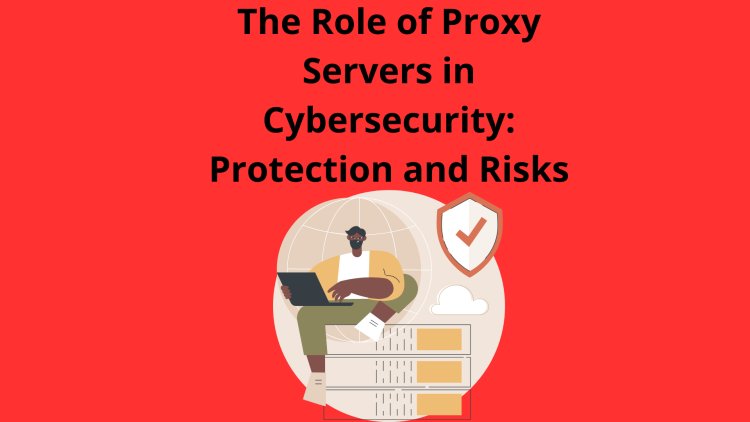The Role of Proxy Servers in Cybersecurity: Protection and Risks
In today’s digital age, online threats are becoming more sophisticated, making it essential for individuals and organizations to protect their sensitive data. One tool that plays a crucial role in enhancing cybersecurity is the proxy server. Proxy servers act as intermediaries between a user and the internet, offering a range of security benefits. However, they also come with certain risks that should be considered. In this article, we’ll explore how proxy servers contribute to cybersecurity, their protective benefits, and the risks they may pose.
What Is a Proxy Server?
A proxy server is an intermediary server that sits between the client (user) and the destination server on the internet. When you use a proxy, your requests are sent to the proxy server first, which then forwards them to the destination server. Once the destination server responds, the proxy server sends the data back to you. This process hides your IP address and helps mask your identity while online.
How Proxy Servers Enhance Cybersecurity
-
IP Masking and Anonymity
Proxy servers hide your real IP address by replacing it with the proxy's IP. This provides a layer of anonymity, making it more difficult for hackers or malicious actors to trace online activities back to the user.
-
Access Control and Content Filtering
Proxies can be configured to block access to harmful or malicious websites, ensuring that users are protected from cyber threats like malware and phishing attacks. Additionally, proxies can enforce access control policies, restricting users from accessing certain websites or applications based on predefined rules.
-
Bypassing Geo-restrictions and Censorship
Proxies allow users to bypass regional restrictions and censorship by masking their geographic location. This enables access to restricted content or websites that may be blocked in certain countries, promoting both security and freedom on the internet.
-
Protection Against DDoS Attacks
A proxy server can mitigate the impact of Distributed Denial-of-Service (DDoS) attacks by absorbing malicious traffic before it reaches the target server. By filtering and redirecting traffic, proxies can reduce the load on servers and ensure that only legitimate traffic is processed.
-
Secure Web Browsing
Proxies, especially SSL proxies or HTTPS proxies, can encrypt the connection between the user and the proxy server, providing a secure communication channel. This prevents third parties from intercepting sensitive information and helps protect against data breaches and eavesdropping.
Risks of Using Proxy Servers
While proxy servers offer multiple benefits for cybersecurity, they also come with potential risks and limitations:
-
Trustworthiness of Proxy Providers
One of the main risks associated with proxies is the trustworthiness of the provider. Free or untrusted proxy services may log your activity, collect personal information, or inject malicious content into your browsing sessions. Choosing a reputable proxy provider is crucial to ensure that your privacy is protected.
-
Incomplete Protection
While proxies can mask your IP address, they don't offer complete protection. Proxies don’t encrypt all types of traffic, meaning that some information may still be exposed to hackers or malicious third parties. A proxy server also does not provide the same level of protection as a VPN (Virtual Private Network), which offers encryption across all internet traffic.
-
Vulnerabilities in the Proxy Server
If the proxy server itself is compromised, it can become a point of attack for hackers. Attackers can exploit vulnerabilities in the proxy server to intercept, alter, or redirect user traffic to malicious sites. Regularly updating and maintaining the proxy server is essential to prevent security breaches.
-
Performance Degradation
Proxies can sometimes slow down your internet connection due to the additional layer of redirection. If the proxy server is under heavy load, or if it’s located far from the user, the overall performance of your connection may suffer, impacting browsing speed and efficiency.
-
Potential Legal Risks
In some cases, using proxies to bypass regional restrictions or access restricted content can violate local laws or terms of service agreements. Users should be cautious and aware of the legal implications of using proxies for activities such as accessing geo-restricted content or engaging in unethical behavior online.
Best Practices for Using Proxy Servers in Cybersecurity
-
Choose Reliable Proxy Providers
To ensure your security, it’s vital to choose a trustworthy proxy service provider. Look for providers with a strong privacy policy and a good reputation for protecting user data. Paid services generally offer better security and performance than free proxies.
-
Combine Proxies with Other Security Tools
While proxies offer significant protection, they should not be relied upon as your only security measure. Combine proxies with VPNs, firewalls, and antivirus software for a more comprehensive cybersecurity strategy.
-
Regularly Update Proxy Servers
Ensure that your proxy servers are updated with the latest security patches. Regular updates will reduce vulnerabilities and protect against cyberattacks.
-
Monitor and Audit Proxy Usage
Regularly audit proxy usage to ensure that it’s being used securely and appropriately. This can help detect any unusual activity or potential security breaches.
Conclusion
Proxy servers are valuable tools in the cybersecurity landscape, offering protection against cyber threats, enhanced anonymity, and the ability to bypass regional restrictions. However, they are not without risks, including potential vulnerabilities, performance issues, and privacy concerns. By understanding both the benefits and risks associated with proxy servers, and following best practices for their use, individuals and organizations can leverage proxies to enhance their online security while minimizing potential threats.



















